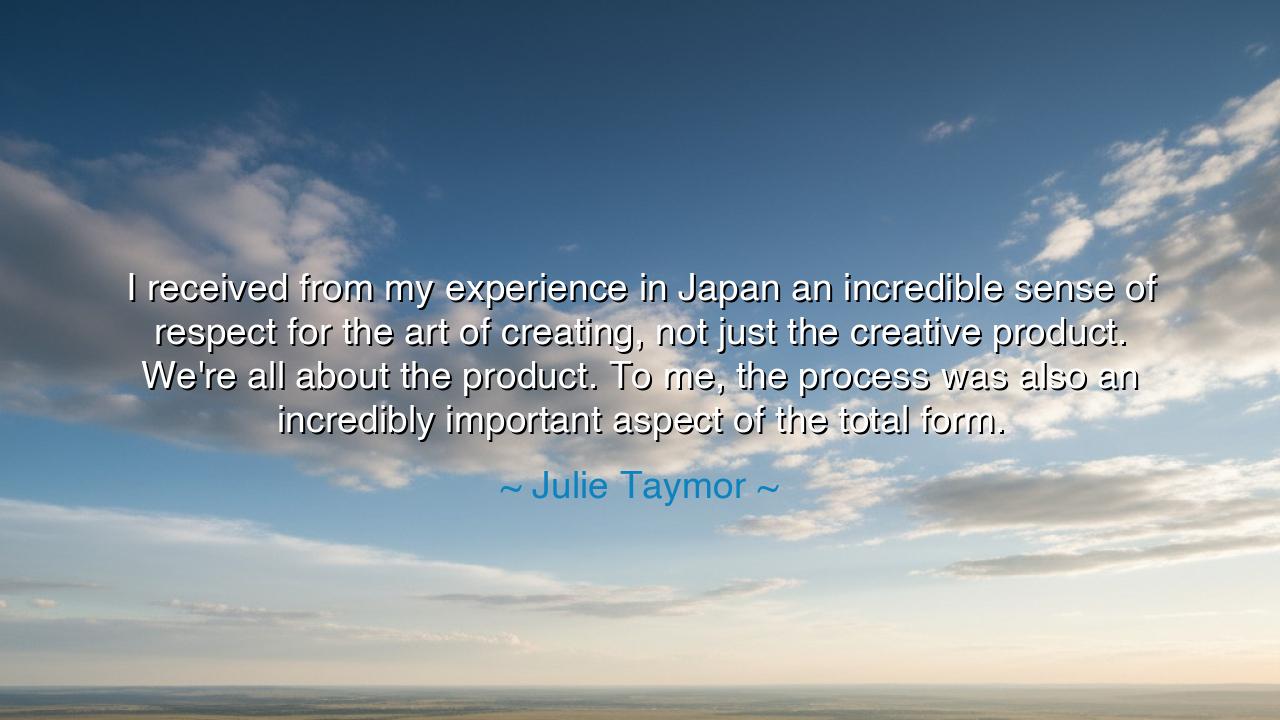
I received from my experience in Japan an incredible sense of
I received from my experience in Japan an incredible sense of respect for the art of creating, not just the creative product. We're all about the product. To me, the process was also an incredibly important aspect of the total form.






In these words of Julie Taymor lies a teaching that echoes across the ages: “I received from my experience in Japan an incredible sense of respect for the art of creating, not just the creative product. We're all about the product. To me, the process was also an incredibly important aspect of the total form.” At first glance, it speaks of art and performance, of brush and mask, of stage and gesture. But if we gaze deeper, it speaks of the way of life itself. Creation is not merely a finished object held in one’s hand, but a living journey that shapes the soul of the one who labors upon it.
In the lands of Japan, Taymor beheld a culture where the process of making is revered as much as, if not more than, the final product. The way of the potter, who kneads clay with meditative patience; the tea master, who stirs the leaves in ritual calm; the craftsman, who sharpens his blade though it has already been sharpened a hundred times—these do not rush toward the end. They know that every breath of effort, every silent gesture, every waiting moment is already part of the final form. This is the wisdom she gathered, a wisdom our modern hearts too often forget.
Consider the tale of the master builder of the Ise Grand Shrine in Japan, which has stood in sacred renewal for over a thousand years. Every twenty years, the shrine is taken apart and rebuilt anew, using ancient techniques passed from father to son, teacher to student. The shrine itself, in material form, is not eternal—wood decays, stones shift—but the process of rebuilding is eternal, and therein lies the true power. The act of creating, the devotion poured into the craft, is the shrine’s real immortality. Here, the lesson is carved in wood and tradition: it is not the product that endures, but the reverence for creation itself.
In contrast, many lands of the modern world have fallen into the cult of the product alone. We rush to unveil, to finish, to sell. The hands that shaped the work are forgotten; the long hours of failure and refinement are hidden. Yet without those struggles, the product would not even exist. By ignoring the process, we dishonor the living river that feeds the sea. Taymor’s revelation calls us back to balance: to cherish the unseen, to walk slowly, to honor the journey.
When the samurai polished his sword, it was not simply to prepare a weapon. It was a meditation, a communion between warrior and steel. When Michelangelo carved his David, he spoke of freeing the figure already trapped within the marble. In both East and West, the great makers understood that process is sacred. Their greatness came not only from their finished masterpieces but from the depth of their devotion to each step along the way.
The lesson we may take is thus: Do not be consumed by the hunger for results. Instead, dwell in the labor itself, let it refine your spirit as much as your work. A student who rushes to the end of the scroll will miss the wisdom between the lines. A singer who cares only for applause forgets the joy of the song rising in her chest. To honor the process is to honor life, for all life is a process unfolding, never complete until the final breath.
Therefore, let each reader take this into practice: when you create, whether it be art, work, or the shaping of your own destiny, slow your hands. Find reverence in the sharpening of the pencil, in the first stroke of the brush, in the humble draft that may never be shown. Celebrate not only the fruit, but the sowing, the watering, the patient tending of the soil. For in truth, the process is where your spirit is forged, and the product is but a reflection of that inner fire.
Thus speaks the wisdom carried from Japan to Taymor, and from Taymor to us. To live as creators is to walk the eternal path, where every step matters, where every act is already art. May you, too, walk it with reverence, and let your life itself become the total form.






AAdministratorAdministrator
Welcome, honored guests. Please leave a comment, we will respond soon